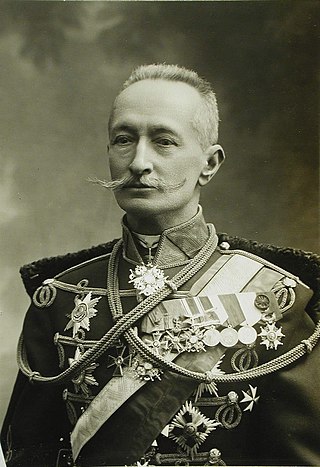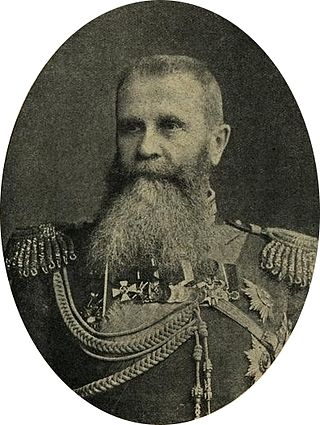
The Brusilov offensive, also known as the "June advance", of June to September 1916 was the Russian Empire's greatest feat of arms during World War I, and among the most lethal offensives in world history. The historian Graydon Tunstall called the Brusilov offensive the worst crisis of World War I for Austria-Hungary and the Triple Entente's greatest victory, but it came at a tremendous loss of life. It was arguably the most successful offensive in the entirety of the First World War. The victory contributed to a morale upsurge among the Russian troops, in 1917, Nicholas II planned a general offensive along the entire front in order to end the Central Powers. After the victory, the Petrograd conference was held at which the post-war structure of the world was discussed. Even despite the losses, the Russian armies were still being reinforced with new forces, the number of weapons increased, and new railways were being built. The result of the battle will fully restore Russia's prestige among the allies, which forced them to make serious territorial concessions, such as Anatolia and Constantinople, the French government confirmed the possibility of the Russians themselves to choose which territories to tear away from Germany after the war.

Grigori Chkhartishvili, better known by his pen name Boris Akunin, is a Georgian-Russian writer residing in the United Kingdom. He is best known as a writer of historical fiction, specifically his Erast Fandorin detective novels. He is also an essayist and literary translator. Grigory Chkhartishvili has also written under pen names Anatoly Brusnikin, Anna Borisova, and Akunin-Chkhartishvili. His characters include Erast Fandorin, Nicholas Fandorin and Sister Pelagia.

Aleksei Alekseyevich Brusilov was a Russian and later Soviet general most noted for the development of new offensive tactics used in the 1916 Brusilov offensive, which was his greatest achievement.
"Let the Thunder of Victory Rumble!" was a de facto national anthem of the Russian Empire in the late 18th and early 19th century.

The Battle of Galicia, also known as the Great Battle of Galicia, was a major battle between Russia and Austria-Hungary during the early stages of World War I in 1914. In the course of the battle, the Austro-Hungarian armies were severely defeated and forced out of Galicia, while the Russians captured Lemberg and, for approximately nine months, ruled Eastern Galicia until their defeat at Gorlice and Tarnów.

The 1945 Moscow Victory Parade, also known as the Parade of Victors, was a victory parade held by the Soviet Armed Forces after the defeat of Nazi Germany. This, the longest and largest military parade ever held on Red Square in the Soviet capital Moscow, involved 40,000 Red Army soldiers and 1,850 military vehicles and other military hardware. The parade lasted just over two hours on a rainy June 24, 1945, over a month after May 9, the day of Germany's surrender to Soviet commanders.

The Kerensky offensive, also called the summer offensive, the June offensive in Russia, or the July offensive in Western historiography, took place from 1 July [O.S. 18 June] to 19 July [O.S. 6 July] 1917 and was the last Russian offensive of World War I. After the abdication of Emperor Nicholas II during the February Revolution, the Russian Provisional Government pledged to fulfill Russia's existing commitments to the Triple Entente, which included launching an offensive in the spring of 1917. The operation was directed at capturing Lemberg and the rest of Galicia from Austria-Hungary.

The Gorlice–Tarnów offensive during World War I was initially conceived as a minor German offensive to relieve Russian pressure on the Austro-Hungarians to their south on the Eastern Front, but resulted in the Central Powers' chief offensive effort of 1915, causing the total collapse of the Russian lines and their retreat far into Russia. The continued series of actions lasted the majority of the campaigning season for 1915, starting in early May and only ending due to bad weather in October.

Nikolai Iudovich Ivanov was a Russian artillery general in the Imperial Russian Army. In July 1914, Ivanov was given command of four armies in the Southwestern Front against the Austro-Hungarian army, winning a major battle of Galicia. During the Russian Revolution of March 1917, Tsar Nicholas II ordered Ivanov to suppress the revolutionaries but as promised reinforcements failed to come to his aid, he canceled the aborted mission. In 1917, he retired but a year later took command of the White Army. In 1919, Ivanov died of typhus in Southern Russia.

Aleksei Ermolaevich Evert was an Imperial Russian general of German descent.

The Battle of Kowel took place during World War I, from 28 July to 8 August 1916. It began with an Austrian counter-attack by Alexander von Linsingen south of Kowel, a city located in the Volyn Oblast (province), in north-western Ukraine. Linsingen intended to halt the Russian offensive under the command of General Aleksei Alekseevich Brusilov.

The Southwestern Front was an army group of the Imperial Russian Army during World War I as part of the Eastern Front war theater.
On August 18, 1914, the Russian Empire invaded the Austrian Crownland of Galicia. On August 19, the Imperial Russian Army defeated the Austro-Hungarian Army, advanced 280–300 kilometers into the territory of Austria-Hungary and captured most of eastern Galicia. The principal city, Lemberg fell into Russian hands on September 3. Eastern Galicia had a population of approximately 4.8 million people.
The Torment of a Broken Heart is a novel by Boris Akunin, the second part of the first book on the adventures of Russian and German spies during the World War I. It describes the dangerous adventures of Aleksei Romanov, who became a military intelligence officer. The story takes place in Switzerland, at the beginning of the First World War.
Children of the Moon is a novel by Boris Akunin, the second part of the second book on the adventures of Russian and German spies during the First World War. It describes the adventures of Aleksei Romanov in St. Petersburg in the autumn of 1915.
The Wandering Man is a novel by Boris Akunin, the first part of the third book on the adventures of Russian and German spies during the First World War. It describes the dangerous adventures of Josef von Theofels in St. Petersburg in early 1916.
Nothing Sacred is a 2010 novel by Boris Akunin, the second part of the fourth book on the adventures of Russian and German spies during the First World War. It describes the new confrontation of Aleksey Romanov and Joseph von Teofels in the autumn of 1916.

The Carpathian Front, sometimes referred to as the Carpathian Winter War of 1915 was one of the largest military operations on the Eastern Front in terms of scale, duration, the number of troops involved in it and the losses of the parties.

The Stavka of the Supreme Commander was the supreme headquarters of the Russian Imperial Army in the field during World War I until the demobilization of the army in March 1918.

The Second Brusilov offensive took place in July–August 1916 on the Eastern Front during the First World War. As a result of the First Brusilov offensive in May–June 1916, the Imperial Russian army defeated the Austro-Hungarian troops and captured a large number of prisoners. But Imperial German army came to the aid of its ally. In July 1916, all Austro-Hungarian troops were subordinated to Paul von Hindenburg and Erich Ludendorff and Hindenburg became commander-in-chief of the entire Eastern Front. The weakest sections of the Austro-Hungarian front were reinforced by German divisions, and most importantly, in the direction of the impending main attack of the Russian Southwestern Front, the defense was mainly occupied by German troops. The offensive was ambiguous, in central Galicia and on the Dniester, the Russians achieved decisive results, but the attacks on Kovel failed. At the same time, the Russians practically stopped losing soldiers captured and killed, but the central powers suffered losses mostly irretrievably.












